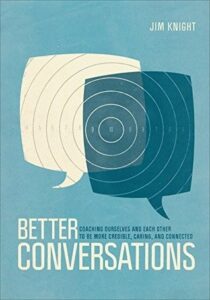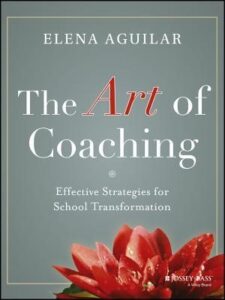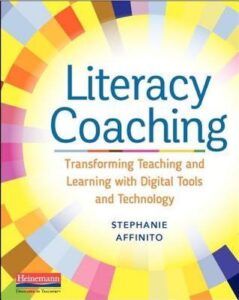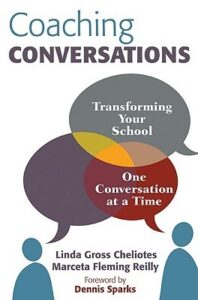by Katie Caprino
As we round out our Culture of Coaching Blog Series this academic year, I want to recommend some book titles that may be helpful as you think about how coaching may play out in your role at Elizabethtown College.
In this blog post, I recommend four texts (three books and one article) and related resources to help you consider your coaching work.
Better Conversations: Coaching Ourselves and Each Other to Be More Credible, Caring, and Connected by Jim Knight

Jim Knight (follow him @jimknight99 on Twitter), partner of the Instructional Coaching Group, wrote a book that was a part of my instructional coaching program. Better Conversations: Coaching Ourselves and Each Other to Be More Credible, Caring, and Connected includes commentary and exercises to help all of us have better conversations. The conversation tips in the book can be applied to our coaching work, of course, but also to our work with our colleagues and advisees. I left this book feeling more prepared to have meaningful conversations, which I believe are at the core of what we have been talking about in this blog series on coaching but also at the core of what we do at Elizabethtown College. Tools related to Better Conversations can be found here.
The Art of Coaching by Elena Aguilar

When I was first starting out with my teacher supervision work about a decade ago, a colleague recommended Elena Aguilar’s (follow her on Twitter @brightmorningtm) The Art of Coaching: Effective Strategies for School Transformation. This book articulates the importance of coaching on school transformation, defines coaching, and gives advice on listening and conversing during coaching cycles. Aguilar is the founder and CEO of Bright Morning Consulting, and you can find several downloadable tools, including reading guides and tools related to the book, here.
If you are looking for other books by Aguliar, you can check out The Art of Coaching Teams; Coaching for Equity: Conversations That Change Practice; and an upcoming title: The PD Book: 7 Habits that Transform Professional Development, written with co-author Lori Cohen (follow her on Twitter @lcctchr). You can listen to a podcast about this upcoming book here.
Literacy Coaching: Transforming Teaching and Learning with Digital Tools and Technology by Stephanie Affinto

Stephanie Affinto (follow her on Twitter @AffinitoLit]’s book Literacy Coaching: Transforming Teaching and Learning provides ways to coach using digital tools. Although written with PK-12 school-based literacy coaches in mind, this book can help us think about ways to develop digital coaching practices here at Elizabethtown College. Affinito’s online The Coaching Sketchnote Book provides several resources that can help you in your coaching practice.
Coaching Conversations: Transforming Your School One Conversation at a Time by Linda M. Gross Cheliotes and Marceta F. Reilly’s

After articulating what a coaching conversation entails, Linda M. Gross Cheliotes and Marceta F. Reilly provide ideas for asking powerful, meaningful questions and shares ways colleagues can engage in reflective feedback. These strategies could be especially helpful in coaching cycles dedicated to teaching.
In their article in the journal Innovative Higher Education, Huston (follow her on Twitter @ThereseHuston) and Weaver provide ideas about how to start a coaching program for faculty members. They provide ideas about reciprocal coaching and one-on-one coaching by trained coaches. They then share six tips for a successful peer coaching program: goal-setting, voluntary participation, confidentiality, assessment, formative evaluation, and institutional support. We can perhaps use these tips as we plan for how coaching might look on our Etown campus. Huston also published a 2021 book about effective feedback: Let’s Talk: Making Effective Feedback your Superpower.
As we continue to envision a culture of coaching on our campus, please share other book or article recommendations that may be helpful as we move forward!
